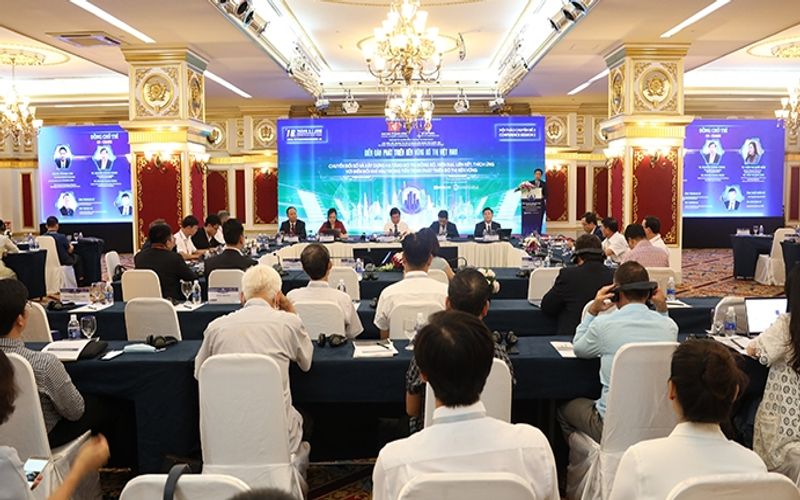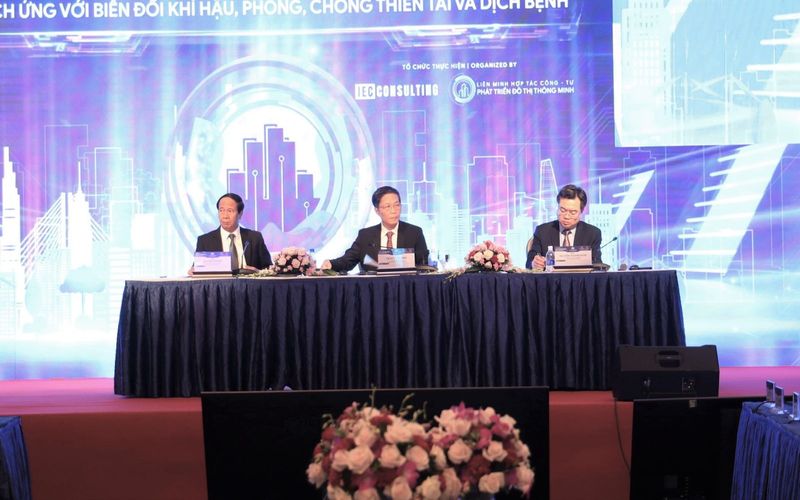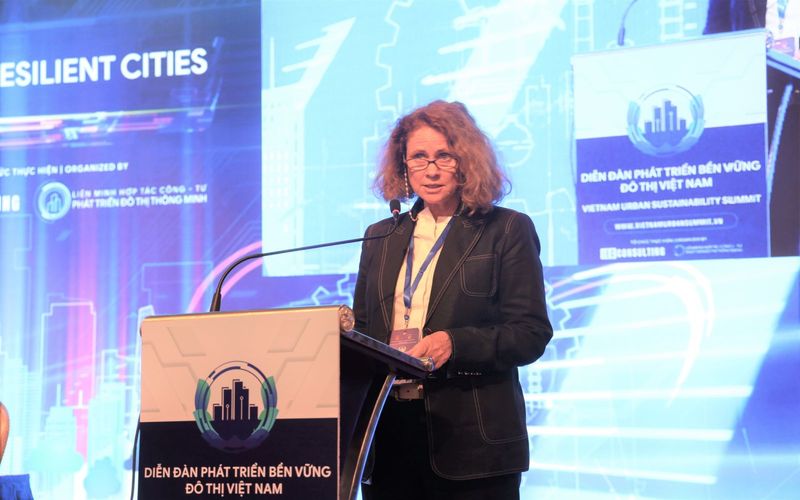Vietnam eyes smart cities and sustainable urban development
Vietnam should focus on accelerating urbanization and the development of a network of national smart cities with links with their peers worldwide.
Vietnam’s policies on developing smart cities and promoting digital transformation have played a very significant role in the country's socio-economic development, Vice Chairman of the Party Central Committee's Economic Commission Nguyen Duc Hien said at the Vietnam Sustainable Urban Development Forum 2022 held in Hanoi this week.
With the theme “Sustainable urban development towards green, smart cities, adaptation to climate change, prevention, and control of natural disasters and epidemics,” the forum is one of the largest which are held annually on urban sustainable development in Vietnam.
An overview of the forum. Photo: Nguyen Ngan |
The vice chairman noted that developing smart cities in Vietnam have only focused on the application of smart-city services, while issues related to smart urban planning and construction management have not been really addressed.
“As many as 41 out of 63 provinces and cities nationwide have developed smart urban development projects, while nearly 40 localities have deployed a number of smart-city services. The role of people in joining the planning and operation of smart cities remains limited,” Hien said.
In addition, participants said smart cities in Vietnam still face some difficulties. They put forth the need and role of smart city development, experience, successful models in smart city development, and specific solutions in planning, managing, and operating smart cities.
Minister of Construction Nguyen Thanh Nghi stressed that building smart cities in association with the development of e-government and digital transformation has brought about initial results, contributing to effectively delivering administrative services at State agencies.
He underlined the need to enhance dialogue and exchange of experience in this work, saying that relevant agencies should urgently research, and develop standards and manuals related to aspects of smart cities.
Deputy Prime Minister Le Van Thanh, Head of the Party Central Committee's Economic Commission Tran Tuan Anh, Minister of Construction Nguyen Thanh Nghi preside over the forum. Photo: Quy Anh |
"We will keep improving mechanisms and policies to fulfill the tasks the Government assigned," Nghi said, appreciating the responsible contributions of domestic and international experts and scientists.
Mentioning sustainable urban development, and building synchronous and modern urban infrastructure, Deputy Prime Minister Le Van Thanh said that Vietnam currently has 869 cities of all kinds. The urbanization rate has increased from 30.5% in 2010 to 40.5% in 2021.
“Technical infrastructure and socio-economic infrastructure have been developed in a synchronous and modern direction. The living quality of urban dwellers has been gradually improved. Strengthening urban management and developing satellite urban areas are aimed at building cities that meet the standards of world modern cities in the era of globalization,” Thanh said.
World Bank Country Director for Vietnam Carolyn Turk at the plenary session said that Vietnam should focus on accelerating urbanization, developing a smart cities network with links with their peers worldwide, and stepping up digital transformation in association with the vision of sustainable urban chains development.
World Bank Country Director for Vietnam Carolyn Turk speaks at the plenary session. Photo: Quy Anh |
Besides, it's imperative to build a system of indicators on urbanization and urban development in accordance with the standards of environmental protection, urban security, and safety, adaptation to climate change, and energy saving, Carolyn Turk said.
She added that Vietnam should devise more feasible and effective policies to ensure resources for the goals of social security, urban renewal, reconstruction, and urban revitalization.
Other delegates analyzed the strategic direction of urbanization and urban development; shared experiences on improving urban governance and developing green, smart, sustainable urban areas.
Larrue Clément, team leader of Regional Urban Development at Agence Française de Développement (AFD) said that Vietnam needs to renew its thinking and reach a consensus about urbanization and sustainable urban development.
“People should understand that urbanization is an objective necessity and an important driving force for rapid and sustainable socio-economic development. Moreover, Vietnam needs to innovate in urban planning methods and processes. This is the most important breakthrough for sustainable urban development and construction. Urban planning must respect market rules and principles of sustainable development, taking into serious consideration the people’s life quality,” Larrue Clément told The Hanoi Times.
Hanoi’s authorities are focusing on implementing Program No.03-CTr/TU dated March 17, 2021 on “urban embellishment, development and economy in the period of 2021 - 2025”. This is an important program, aiming to quickly and sustainably develop Hanoi in the direction of a green, smart and modern city for ensuring a harmonious connection between urban and rural areas. Besides, the program sets the taget to build two or three new smart-oriented urban areas by 2025. Along with that, Hanoi has issued regulations on incentive mechanisms and policies to encourage and attract investors, on responsibility of investors and local authorities in developing new urban areas and smart cities. |













